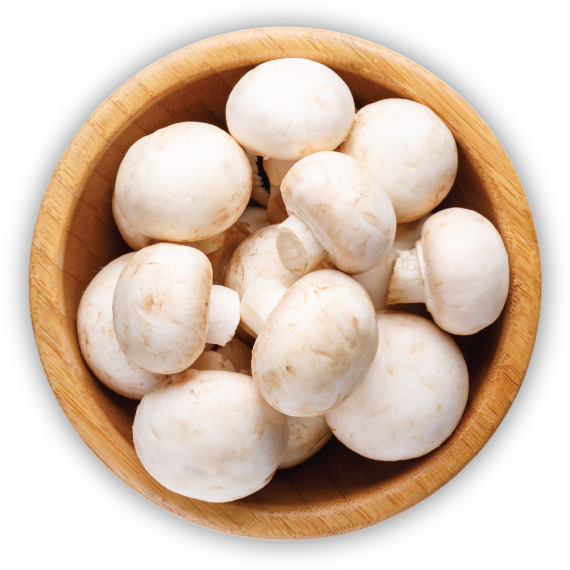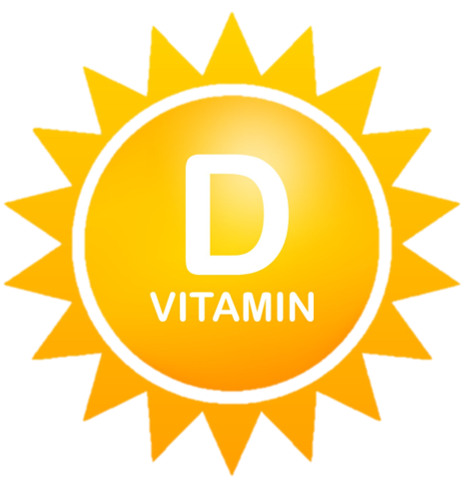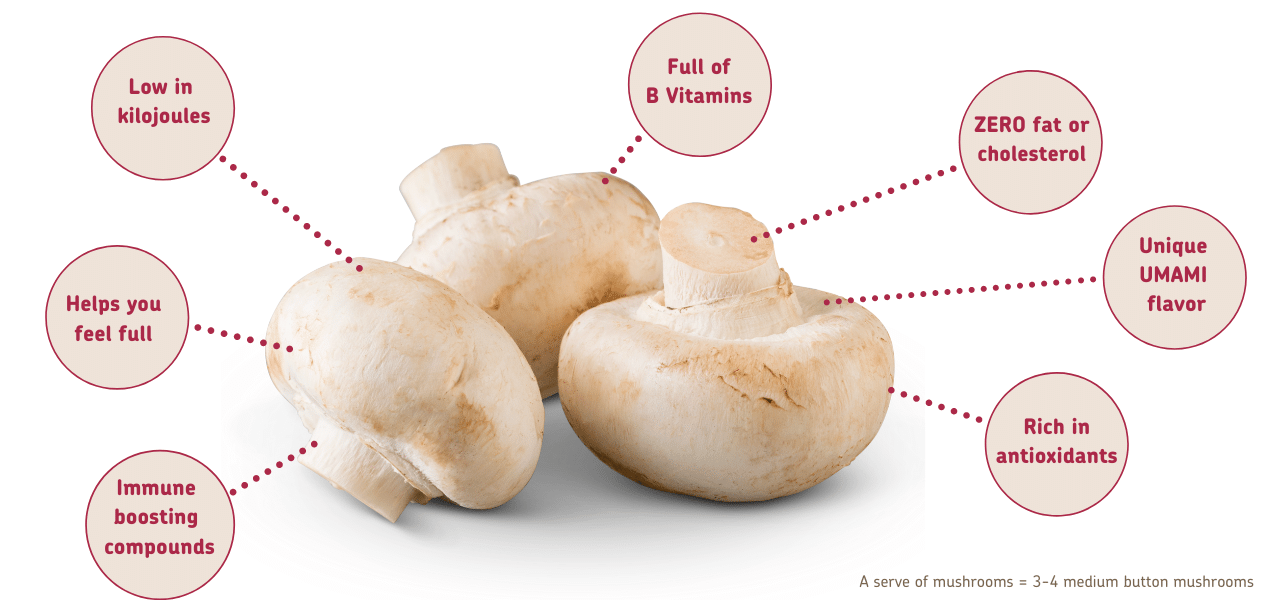Mushrooms contain a unique blend of vitamins, minerals and antioxidants that the whole family needs.
Dietitians recommend eating just one serve of mushrooms (3-4 medium button mushrooms) to give you a quarter (25%) of your daily needs of the essential vitamins, riboflavin, biotin, niacin and pantothenic acid, while contributing to your folate needs too.
Why are mushrooms so MIGHTY?
Mushrooms are loved for their delicious taste, but they also pack a real nutritional punch and provide a different range of nutrients and benefits to common vegetables.
Why? Because mushrooms are not a vegetable, they are fungi. In fact, mushrooms (fungi) evolved at a much later time than plants and reside in their own biological kingdom. Mushrooms are unique and so is their nutrition profile.
Mushrooms have been long celebrated as a superfood, with a powerful source of nutrients. A serve of mushrooms (3 mushrooms/100g) provides more than 20% of the daily needs for 6 essential nutrients: riboflavin, niacin, pantothenic acid, biotin, copper and selenium, while also providing an appreciable amount of folate and bioactive compounds. Plus, mushrooms can contain 100% of your vitamin D requirements, if they are exposed to sunlight or UV lamp.
No vegetable can match the nutrient profile of the mushroom.



BOOST the Vitamin D in Mushrooms!
Did you know, that if you place any store bought mushrooms in the sun for just 15-minutes, they will 'super charge' with vitamin D!
Nutrients in Mushrooms
Essential Vitamins
A serve of mushrooms (3-4 medium button mushrooms) gives you about a quarter (25%) of your daily needs of the essential vitamins riboflavin, biotin, niacin and pantothenic acid, while contributing to your folate needs too.
Niacin
Niacin is involved in maintaining healthy red blood cells, healthy nerve function and in the release of energy from carbohydrate, protein and fat. So, the fitter you are, the more niacin you need.
Pantothenic Acid
Pantothenic acid is involved in more than 100 different steps in making neurotransmitters, hormones and haemoglobin, the protein that carries iron around your body.
Biotin
Biotin is involved in the normal body metabolism including the production of glucose. It works primarily as a co-enzyme, meaning that it allows enzymes to function properly.
Vitamin B12
You will often hear that mushrooms have vitamin B12, a vitamin that is also found in animal foods. It’s true, there is vitamin B12 in mushrooms, but it is only a small amount, mainly near the surface of the mushroom.
Vitamin D
Vitamin D is very important for the absorption of calcium from foods and growing healthy bones. About one in four Australians are deficient in vitamin D, more during the winter months.
When harvested, mushrooms don't contain high levels of vitamin D, but remarkably, they can produce it! Much like our skin converts the sun into vitamin D, mushrooms are able to make a similar conversion.
If you put your store-bought mushrooms in direct sun light for around 15 minutes, the mushrooms will convert vitamin D and store it for up to a week. They will need less time in the sun if the mushrooms are sliced (because a greater surface area is exposed to the sun). We call this 'tanning' your mushrooms, but it doesn't change the colour, texture or flavour of your mushrooms... they are just better for you!
You can also buy vitamin D enhanced mushrooms from a few local greengrocers or supermarkets. Look for the vitamin D label on the pack. After harvesting, growers expose their mushrooms to a special UV-lamp which 'supercharges' their vitamin D levels naturally.
Amazingly, this new enhanced levels of vitamin D stores in the mushroom for up to a week and is mostly retained during the cooking process too.
Minerals
A serve of mushrooms (3-4 medium button mushrooms) gives you about a quarter (25%) of your daily needs of the essential minerals selenium, chromium and copper, along with 10% of your daily needs of potassium and phosphorus.
Selenium
Selenium is one of the body’s antioxidants nutrients helping to prevent free radical formation. It is also involved in immune function and reproductive health. A serve of mushrooms can provide a quarter of your daily needs of selenium. A lack of selenium has been implicated in the cause of both heart disease and some cancers.
Chromium
Chromium assists with the action of insulin and therefore it may help blood glucose control in people with diabetes.
Copper
Copper is important in the formation of bone and tendons, iron metabolism, the production of red blood cells, and normal immune function. About one quarter of your daily copper needs are found in a serve of mushrooms.
Potassium
Potassium is a natural mineral in mushrooms and plant foods that plays a major role in maintaining fluid and electrolyte balance in the body. A diet with plenty of potassium and low in sodium (salt) appears to both prevent and help correct high blood pressure. This, in turn, helps to prevent strokes. A serve of mushrooms will give you about 10% of your daily potassium needs.
Phosphorus
Phosphorus is also a common mineral and a serve of mushrooms will provide about 10% of your daily needs. The main role of phosphorus is, in combination with calcium, to form the structure of teeth and bones.
References:
1. Australian Bureau of Statistics (2013). Australian Health Survey: Biomedical Results for Nutrients 2011-12, https://www.abs.gov.au/statistics/health/health-conditions-and-risks/australian-health-survey-biomedical-results-nutrients/latest-release
2. Australian Food Composition Database (2019) (https://www.foodstandards.gov.au/science/monitoringnutrients/afcd/Pages/default.aspx) [F005946 mushroom]
3. Cardwell G., Bornman J.F., James A.P., Black L.J. (2018) A review of mushrooms as a potential source of dietary vitamin D. Nutrients 10, 1498; doi:10.3390/nu10101498
4. Nutrient Reference Values for Australia and New Zealand, Commonwealth of Australia 2006
5. Koyyalamudi S.R., Jeong S-C., Manavalan, S., Vysetti, B., Pang, G. (2013). Micronutrient mineral content of the fruiting bodies of Australian cultivated Agaricus bisporus white button mushrooms. Journal of Food Composition and Analysis 31, 109-114
6. Koyyalamudi SR, Jeong SC, Cho KY, Pang G. (2009) Vitamin B12 is the active corrinoid produced in cultivated white button mushrooms (Agaricus bisporus). Journal of Agricultural & Food Chemistry 57 (14), 6327-6333
7. Mann J. & Truswell A.S. (2012) Essentials of Human Nutrition 4th edition, Oxford University Press, New York.
8. Ross A.C., Caballero B., Cousins R.J., Tucker K.L., Ziegler T.R. (2014) Modern Nutrition in Health and Disease, 11th edition, Lippincott, Williams and Wilkins, Philadelphia, USA.
Downloadable Resources
Mushrooms at a glance
A simple fact sheet that gives an overview of mushrooms' nutritional benefits. Download the PDF.
Mushroom nutrition facts panels
Mushrooms for Health nutrition fact sheet, outlining mushrooms vitamins and mineral content and their benefits. Download the PDF



